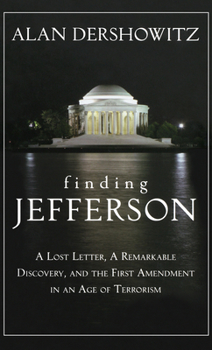Finding Jefferson: A Lost Letter, a Remarkable Discovery, and the First Amendment in an Age of Terrorism
Select Format
Select Condition 
Book Overview
Related Subjects
19th Century Civil Rights Civil Rights & Liberties Constitutional Law History Law Modern (16th-21st Centuries) National & International Security Philosophy Political Science Politics & Government Politics & Social Sciences Revolution & Founding Social Sciences Specific Topics TerrorismCustomer Reviews
Rated 5 starsAlan Dershowitz has always been a hero to me............
....and that's a hell of a thing for a conservative Republican to say. I've always liked his style, even when I disagree. This short, but profoundly great, book gives his views of the First Amendment, filtered thru the metaphorical lens of a short letter written by Mr. Jefferson in 1801. Despite profound differences, Mr. Dershowitz and I share some things in common: [1] We are both pack-rats [2] We both revere Thomas Jefferson...
0Report
Rated 4 starsWhy he cares
Alan Dershowitz and Thomas Jefferson were collectors. Dershowitz, inter alia, collects antiquities. He loves objects with aesthetic and historical significance. Dershowitz travels to flea markets and book stores seeking treasure. Much of the focus of his legal activities has centered on the line between speech and act. The greatest acquisition of the author's career as a collector came from the Argosy Bookstore. It...
0Report
Rated 5 starsThoughts Inspired by Finding Jefferson
Saturday Night: I received Finding Jefferson as a gift today from my sister-in-law Linda. Thank you Linda, I loved it. I read the book today, I thought about it today, and I wrote these comments today. I have always thought of myself as a Free-Speech Absolutist. I still want to call myself that but here are my thoughts - inspired by Jefferson and Dershowitz. 1) An anonymous man on a soapbox in the middle of a public park...
0Report














